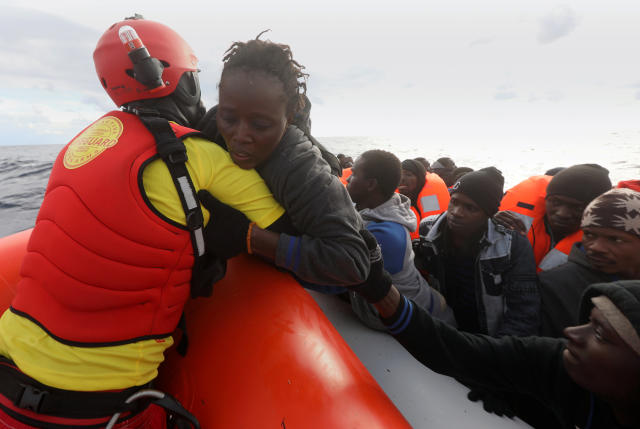
The latest search and rescue operation in the stretch of sea separating Libya and Italy highlights some of the brutal treatment that female refugees and migrants are subjected to.
More than 2,500 people were rescued in the Mediterranean Sea over the weekend in one of the roughest missions so far this year, the International Organization for Migration said Tuesday. Thirty-four bodies were recovered from the water, 26 of them suspected to be teenagers from Nigeria. Most died while making the crossing toward Italy in rubber dinghies.
IOM believes the girls may have been “murdered by traffickers in league with European sex merchants.”
Salvatore Malfi, the prefect of the Italian port city of Salerno, was skeptical of this theory but said it’s too early to come to any conclusion about whether the girls were headed for prostitution. The girls traveled with other men in the dinghy, he said, which makes the theory less likely.
“The sex trafficking routes are different,” he said. “Loading women onto a boat is too risky, the traffickers would not do it as they could lose all their ‘goods’ ― as they describe them ― in one fell swoop.”
Italian authorities told CNN that they launched an investigation into the girls’ deaths Tuesday, carrying out autopsies to determine whether they had been victims of sexual abuse or torture. They were all between 14 and 18 years old, said Salerno police chief Lorena Ciccotti.
More than 80 percent of Nigerian women who arrived in Italy by sea during the first six months of 2016 may have later become trafficking victims, a 2016 IOM report found.
About 1,500 Nigerian women and girls made it to Italy in 2014, said Federico Soda, director of IOM’s Coordination Office for the Mediterranean. That number exploded in 2016 to 11,000.
The route used by these women has become a death trap for people escaping their home countries, due to the torture they experience before reaching the water and the high fatality rate once en route to Italy.
Smugglers operate vast networks across the Middle East and Africa, exploiting vulnerable people who pay to escape. Abuse, violence and detention are commonplace.
Three-quarters of the migrant children interviewed in a February UNICEF report said they had experienced violence, harassment or aggression at the hands of adults. Almost half the women interviewed said they’d experienced sexual violence or abuse during their journey.
A total of 154,609 migrants and refugees have entered Europe by sea this year, about 75 percent of whom used the Libya-Italy route, IOM said. The rest arrived via Greece, Spain or Cyprus. Almost 3,000 have died.
No comments:
Post a Comment